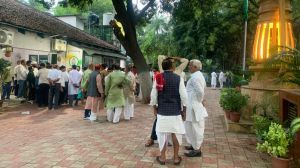Naipaul’s middle passage to India
Sir Vidiadhar Surajprasad Naipaul, Nobel Laureate and internationally anointed authority on India, has sprung to the defence of Tehelka.com,...

Sir Vidiadhar Surajprasad Naipaul, Nobel Laureate and internationally anointed authority on India, has sprung to the defence of Tehelka.com, lamenting that the government’s ‘lack of graciousness’ towards the news portal will be severely detrimental to India’s nascent intellectual life.
It is an intellectual life whose existence Sir Vidia has only recently come to admit. At the Nobel prize ceremony in 2001, he said when he first began writing, India did not have an intellectual capacity to appreciate or understand his books.
However since then there has been a hopeful awakening of Indian ‘self awareness’, and after centuries of degradation, of mimicry, and of ‘defecating everywhere’ Indians are at last being able to acknowledge how constructive he’s been for the birth of the Indian mind.
Yet, Sir Vidia has begun to sound so terribly self-contradictory! On the one hand, he states that the BJP movement is a ‘movement from the earth’, that the destruction of the Babri masjid was a manifestation of ‘Hindu awakening’.
But while he celebrates Hindu awakening on the one hand, he is curiously disdainful of Hindu literature on the other. On the dais with Atal Behari Vajpayee at the inauguration of a literary festival two years ago, he waved aside the prime minister’s speech on ancient Indian literature and stories from bhasha literature and argued for a robust modernism that creates new modern writing rather than looking to the stories from the Hindu past.
Although in India: A Million Mutinies, he had quoted the poetry of Dalit poet Namdeo Dhasal and described it as moving, he recently said tales of ‘oppression’ were banal and wearying. In a recent interview, Sir Vidia said it was the duty of the Indian intelligentsia not to use ‘European’ terms of abuse against Hindutva, yet he also recently said that colonialism was no longer an issue and fifty years after independence it is irrelevant to think in terms of ‘European’ and ‘Indian.’
Sir Vidia believes there can be no ‘return to the past’. Yet he also celebrates India’s return to the past. He believes firmly in the BJP, but he doesn’t tell us how he is going to safeguard his views from becoming an apologia for the VHP mob. At the recent Bharatiya Pravasi Divas celebrations he thundered that Indians must shed their sense of victimhood. But in A Wounded Civilisation, he had written that unless Indians wake up to a racial sense, of a sense of being a single race against other races, it will be calamitous for India.
He believes ‘inherently fanatical’ Islam was the greatest calamity to befall India yet says nothing on contemporary Hindu fanaticism. He urges the intelligentsia to reclaim Hindutva from the mob, but has no ideas on how this can be done.
In Among The Believers, he asserts that Islam is an eraser of past histories, that wherever Islam conquers it determinedly stamps out preceding civilisations, just as in India and Indonesia, it stamped out the Buddhist-Hindu legacy and destroyed historical memory. But if such a universal destruction had taken place how has the new awakening taken place again?
Sir Vidia’s gaze is perhaps too firmly fixed on the destruction of Hindu empires by invading Muslim kings. He neglects to cast his eye on the innumerable little traditions of Hindu Muslim synthesis that are being increasingly studied by newer generations of post-colonial scholars. Rampuri Islam, Tamil Islam, Malayali Islam, the Islam of the folk saints of Bengal are not conquering forces. Rather they have been absorbed into a common local religious space and far from erasing historical memory actually co-exist with it.
Sir Vidia’s views on India are as changeable as the vicissitudes of Indian history. Over the years his positions have shifted incorrigibly. In A Wounded Civilisation he was hopeless. In India: A Million Mutinies he was hopeful. Today he urges a robust modernism but at the same time celebrates Hindu nativism as authentic.
He says in India there has never been any room for outsiders. But he also believes that Gandhi, educated in London, and Rammohan Roy influenced by French thought, were ‘outsiders’ who wrought crucial changes in history. He’s irritated by Indian women and all talk of gender, yet at the same time is admiring of the growth of women’s magazines, particularly Woman’s Era whose editorial tone is one of ‘love’.
There have been fierce criticisms of Sir Vidia for exhibiting his cultural and historical wounds for approving western patrons as a beggar might display his bleeding sores for a few pennies and a Nobel prize.
He has been attacked for becoming the messiah of those who seek anti-politically correct views on India and for assuaging British guilt about the Raj. Liberals loathe his ‘ill-informed’ views on Islam and fellow Caribbeans have pointed to his ‘insidious flattery’ of the West, for leaving no one in any doubt about where he considers the word’s cultural centre to be located.
Yet in spite of the severe problems with the Naipaul persona, you may pick up The Enigma Of Arrival, teeth clenched against wogs who try and become Englishmen and make a decision that you will hate the book almost as much as you hate the man, yet you will find that there is no power on earth that can keep you from being seduced by the beauty of the prose or the utterly moving, clear quiet gaze.
And this in a sense is the triumph of Naipaul. He makes himself almost as hateful as the subcontinent he despises. He sets himself up for ridicule, the top-hatted darkie with the Bertie Wooster accent who uses self-contempt and unfashionably nasty views on India to sell his books.
Yet once the reader begins to read A House For Mr Biswas, or The Enigma of Arrival or India: A Million Mutinies Now, a strange force begins to emanate from the words. The words in themselves describe ugliness and rawness, they seem disdainful and patronising but at the same time they seem to come from a agitated howl within.
And so however vicious the critique, however stern the reader’s own post-colonial predilections, Sir Vidia earns sympathy from the reader and keeps it forever. Like India, he is brutal, he is not pretty, yet the power of his words is irresistible.
But in the end, India has defeated Sir Vidia. It has defeated his belief that the only hope of Indian decay was more decay. It has defeated his conclusion that Islam had stamped out all sense of history.
It has defeated his treatise that institutions dismantled by the Emergency would never be put together again. And it has defeated his observation that India was a land where the intellect had died.
Sport, infotech, infrastructure, tourism, Bollywood, Panchayati Raj techno-religion, global entrepreneurs, cultural fusion and bounding new talents are blowing the bottom out of Naipaul’s early conclusions. The million mutinies of ‘rage’ and revolt’ have overwhelmed their chronicler, leaving him, today, in a welter of contradictions.
Yet Sir Vidia is probably not completely unhappy at being defeated. He’s 15 years older than independent India and has been its worthiest adversary.
Write to sagarikaghose@expressindia.com






- 01
- 02
- 03
- 04
- 05

























